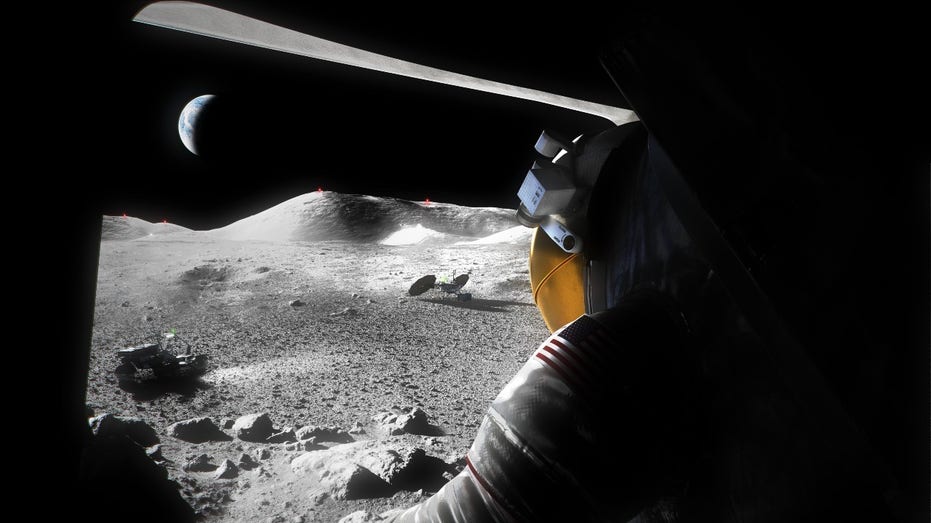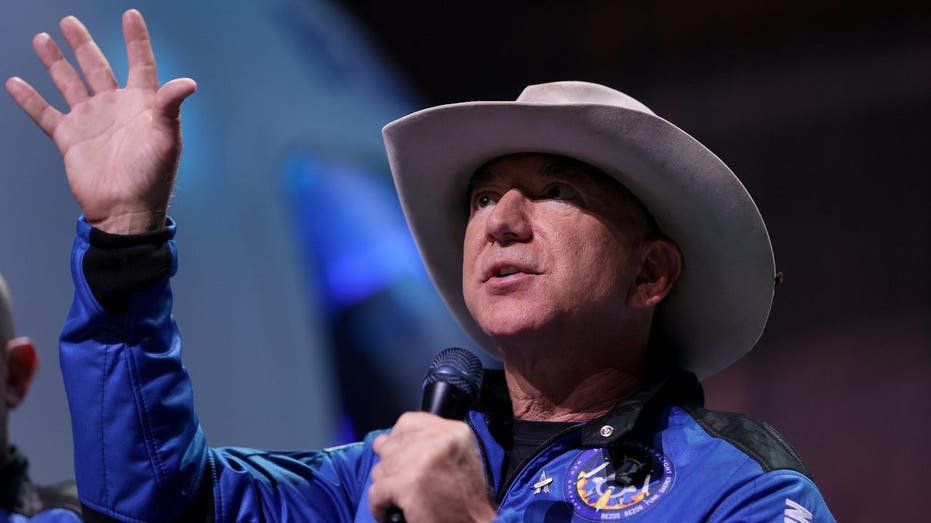Jeff Bezos' Blue Origin expresses interest in NASA's second Artemis lunar lander contract
NASA plans to issue a formal request for lander proposals this summer
FOX Business Flash top headlines for March 25
Here are your FOX Business Flash top headlines for March 25.
Jeff Bezos' Blue Origin expressed interest in bidding on a second lunar lander contract for NASA's Artemis Program that will bring American astronauts back to the moon for the first time in more than 50 years.
ONEWEB TO LAUNCH SATELLITES WITH RIVAL SPACEX AFTER SUSPENDING TIES WITH RUSSIAN AGENCY
The Sustaining Lunar Development contract will offer an alternative to SpaceX's Starship, which is aiming to transport the first woman and first person of color to the moon in 2025 or 2026 as part of NASA's Artemis III mission. The new landers, which will be built and operated according to NASA’s long-term requirements at the moon, will have the capability to dock to a lunar orbiting space station called Gateway, increase crew capacity and transport more science and technology to the surface.
"Blue Origin thrilled that NASA is creating competition by procuring a second human lunar landing system. By doing so, NASA will establish the critical redundancy and robustness needed for establishing permanent U.S. lunar presence," the company told FOX Business in a statement. "Blue Origin is ready to compete and remains deeply committed to the success of Artemis. We will continue to work with NASA to achieve the United States’ goal to return to the Moon as soon as possible."

An illustration of a suited Artemis astronaut looking out of a Moon lander hatch across the lunar surface, the Lunar Terrain Vehicle and other surface elements. (NASA)
NASA Administrator Bill Nelson said during a press conference on Wednesday that the agency is "expecting to get this competition started in the fiscal year 2023 budget." NASA plans to issue a formal request for lander proposals this summer.
"Under Artemis, NASA will carry out a series of groundbreaking missions on and around the Moon to prepare for the next giant leap for humanity: a crewed mission to Mars," Nelson said in a statement. "Competition is critical to our success on the lunar surface and beyond, ensuring we have the capability to carry out a cadence of missions over the next decade."
BLUE ORIGIN SPACEFLIGHT: ‘SNL’ STAR PETE DAVIDSON REPLACED BY NEW SHEPARD ARCHITECT GARY LAI
When NASA originally awarded SpaceX the $2.9 billion HLS contract in April 2021, the agency only had enough funding to award one company.

Jeff Bezos speaks about his flight on Blue Origin’s New Shepard into space during a press conference on July 20, 2021 in Van Horn, Texas. Mr. Bezos and the crew that flew with him were the first human spaceflight for the company. (Photo by Joe Raedle/Getty Images / Getty Images)
Blue Origin and aerospace company Dynetics both filed protests, arguing that SpaceX received preferential treatment during the HLS selection process. However, NASA's decision was ultimately upheld by the Government Accountability Office, which said the protests failed to establish "any reasonable possibility of competitive prejudice." Blue Origin took the HLS contract fight a step further, filing a lawsuit against the federal government in the U.S. Court of Federal Claims, though the court ended up dismissing the case.
CLICK HERE TO READ MORE FROM FOX BUSINESS
SpaceX will conduct its crewed demonstration mission no earlier than April 2025. In addition, NASA has exercised an option in the HLS contract to transform the Starship human landing system into a spacecraft that meets the agency’s requirements for recurring services for a second demonstration mission.
"This strategy expedites progress toward a long-term, sustaining lander capability as early as the 2026 or 2027 timeframe," HLS program manager Lisa Watson-Morgan said in a statement. "We expect to have two companies safely carry astronauts in their landers to the surface of the Moon under NASA’s guidance before we ask for services, which could result in multiple experienced providers in the market."
Following Artemis III, NASA anticipates one human landing per year over the next decade, with the first human mission to Mars slated for sometime in the late 2030s or 2040.





















